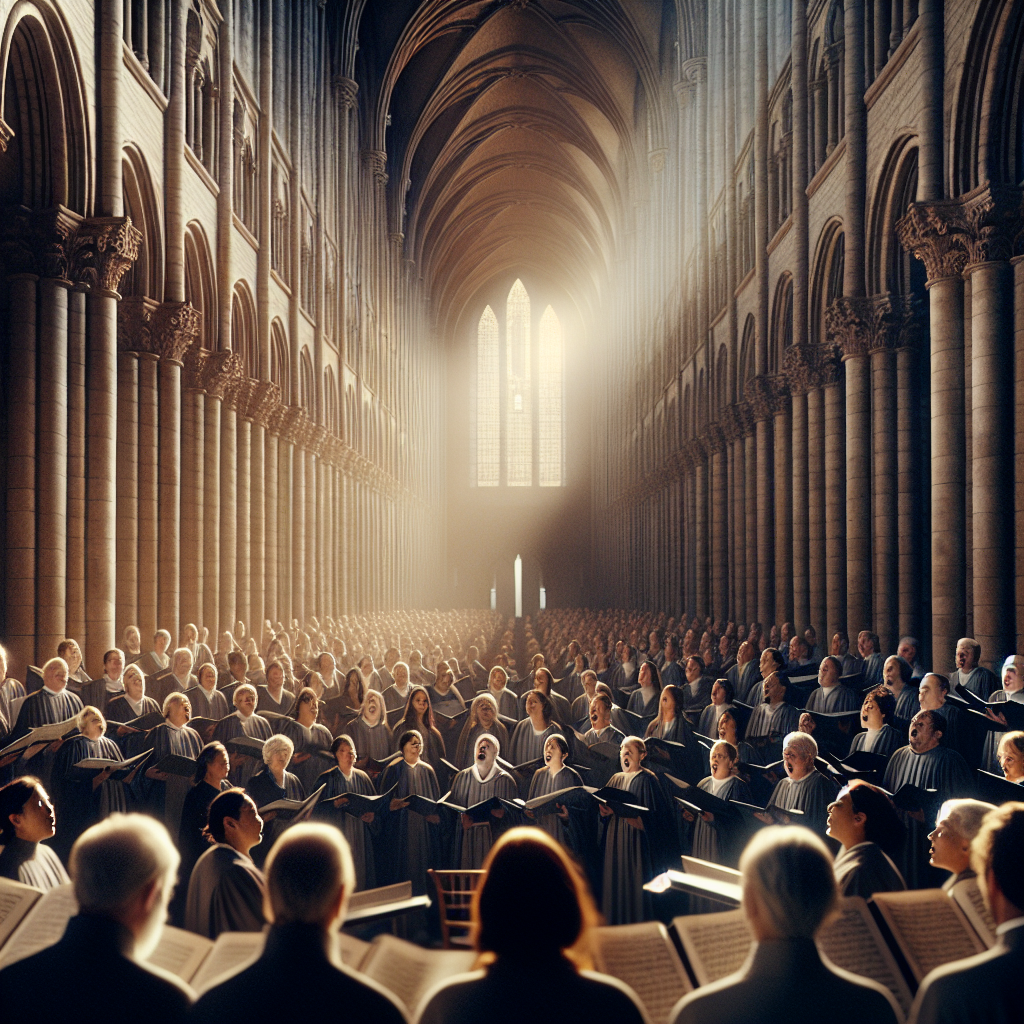Spiritual Devotional about Sacred Music
Harmonies of Heaven: Discovering the Spiritual Power of Sacred Music
Hello, Beloved!
Isn’t it wonderful to think about how music can touch our souls and lift our spirits? Today, I want to talk about a special kind of music that transcends the ordinary and brings us closer to the divine: sacred music.
Sacred music has been a part of spiritual traditions for millennia, and it’s not hard to see why. When we listen to or sing hymns, psalms, and other spiritual songs, something extraordinary happens within us. Our hearts open, our minds calm, and our spirits soar. It’s as if we can feel the presence of God moving through each note and melody.
The Bible is filled with references to the power of music. One of the most beautiful examples comes from the book of Psalms. King David, a man after God’s own heart, was a master of sacred music. He wrote many of the Psalms, which were often set to music and used in worship. Psalm 100:2-3 says, "Worship the Lord with gladness; come before him with joyful songs. Know that the Lord is God. It is he who made us, and we are his…"
These verses remind us that singing to the Lord is a joyful act of worship and recognition of God’s majesty and creation. Each time we raise our voices in song, we are not just singing words; we are expressing our gratitude, our love, and our devotion.
In the New Testament, Paul and Silas give us a powerful example of the transformative power of sacred music. In Acts 16:25, we read that, despite being in prison, they were praying and singing hymns to God. Their faith and joy in the Lord were so strong that even in chains, they couldn’t help but sing! And what happened next? An earthquake shook the foundations of the prison, opening the doors and freeing the prisoners. God responded to their praise with a miraculous display of His power and love.
Isn’t it incredible to think that our songs of praise could be so powerful? Whether we’re singing in a grand cathedral, a small church, or our living rooms, sacred music allows us to connect with God in a meaningful and profound way. It lifts our spirits in times of trouble, brings comfort in times of sadness, and amplifies our joy in times of celebration.
But you don’t need to be a trained musician to enjoy the benefits of sacred music. The Bible tells us in Psalm 98:4, "Make a joyful noise to the Lord, all the earth; break forth into joyous song and sing praises!" Notice that it says "joyful noise," not "perfect harmony." God loves to hear your voice just as it is—each note offered from the heart is music to His ears.
So, why not incorporate more sacred music into your daily life? Make a playlist of your favorite hymns and contemporary worship songs. Sing along or listen quietly during your morning devotions. Let the soothing sounds fill your home as you go about your day. You’ll find that these melodies have a way of re-centering your thoughts, calming your spirit, and keeping you connected to God’s love.
Remember, music is a gift from God, and sacred music is our gift back to Him. It’s a beautiful, harmonious way to celebrate our faith, uplift our spirits, and unite as a community of believers. So, let’s keep singing His praises with joyful hearts and let the harmonies of heaven resonate within us every day.
With a song in my heart and blessings to you all,
[Your Name]
Explore and dig up answers yourself with our BGodInspired Bible Tools! Be careful – each interaction is like a new treasure hunt… you can get lost for hours 🙂
Q&A about Sacred Music
Sure! Here is a Q&A based on Sacred Music:
Q: What is sacred music?
A: Sacred music is a genre of music that is created for religious purposes and is used in worship, rituals, or other spiritual or religious ceremonies. It often includes vocal and instrumental compositions associated with various religious traditions including Christianity, Judaism, Islam, Hinduism, and Buddhism.
Q: What are some examples of sacred music in Christianity?
A: Examples of sacred music in Christianity include Gregorian chant, hymns, spirituals, psalms, and contemporary worship music. Notable works include Handel’s “Messiah,” Bach’s “Mass in B Minor,” and traditional hymns like “Amazing Grace” and “A Mighty Fortress is Our God.”
Q: What is Gregorian chant, and what makes it significant in sacred music?
A: Gregorian chant is a form of plainchant that is characterized by its monophonic, unaccompanied vocal music used in the Roman Catholic Church. Named after Pope Gregory I, it is significant because it formed the foundation of Western sacred music and has been a central part of liturgical practice since the 9th century.
Q: How does sacred music differ across different religions?
A: Sacred music differs across religions in terms of style, language, instrumentation, and purpose. For example, Islamic sacred music includes the recitation of the Quran called Qira’at, which is highly melodic and intricate. Jewish sacred music includes cantillation and the singing of Psalms. Hindu sacred music encompasses bhajans and kirtans, which often involve devotional singing and traditional instruments like the harmonium and tabla.
Q: Can you name some famous composers of sacred music?
A: Famous composers of sacred music include Johann Sebastian Bach, Wolfgang Amadeus Mozart, Antonio Vivaldi, Johann Pachelbel, Thomas Tallis, and more recent composers like John Rutter and Arvo Pärt.
Q: What role does sacred music play in modern religious practices?
A: In modern religious practices, sacred music continues to play an essential role in worship and spiritual life. It helps to create a sense of reverence and community, enhance liturgical celebrations, and provide emotional and spiritual upliftment to practitioners.
Q: How has sacred music evolved over time?
A: Sacred music has evolved significantly over time, adapting to cultural, social, and technological changes. It started with simple monophonic chant and has developed into complex polyphonic compositions, incorporating various musical instruments, styles, and influences from different musical periods such as the Renaissance, Baroque, Classical, Romantic, and contemporary eras.
Q: What is the significance of the organ in sacred music?
A: The organ is a significant instrument in sacred music due to its powerful and versatile range, which can mimic an entire orchestra. It has been used extensively in Christian worship services, particularly in Catholic and Protestant churches, to accompany congregational singing, choir performances, and solo organ recitals. The organ’s majestic sound is considered suitable for creating a solemn and awe-inspiring atmosphere in places of worship.
Q: What are some popular genres of sacred music outside of the Western tradition?
A: Popular genres of sacred music outside the Western tradition include Qawwali and Nasheeds in Islam, Shomyo and Sutra chanting in Buddhism, Bhajans and Kirtans in Hinduism, and Baqashot and Piyyutim in Judaism. Each of these genres incorporates unique elements from their respective cultural and religious contexts.
Feel free to ask more specific questions if you need further details!


